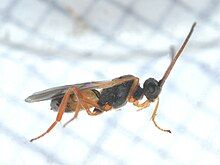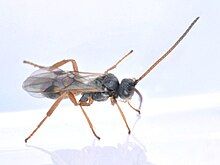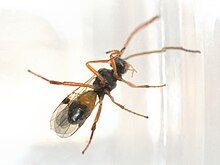Microplitis mandibularis
| Microplitis mandibularis | |
|---|---|

| |
| Scientific classification | |
| Domain: | Eukaryota |
| Kingdom: | Animalia |
| Phylum: | Arthropoda |
| Class: | Insecta |
| Order: | Hymenoptera |
| Family: | Braconidae |
| Genus: | Microplitis |
| Species: | M. mandibularis
|
| Binomial name | |
| Microplitis mandibularis (Thomson, 1895)
| |
Microplitis mandibularis (Thomson 1985[1]) (formerly Microgaster mandibularis Thomson, 1895) is a gregarious parasitoid wasp in the family Braconidae (Hymenoptera).
Several eggs are laid in lepidopteran larvae and erupt to spin their cocoons when the caterpillar is in the final instar. Hosts are moths of the family Noctuidae. Those reported by Güçlü & Özbek[2] include: Conistra vaccinii, Jodia croceago, Lithophane ornitopus, Noctua fimbriata, Xanthia ocellaris, with additional records of host species Lasionycta proxima,[3] and Xylena vetusta.[4]
van Achterberg[5] gives a key for identification of Braconidae from Greenland that includes a description of M. mandibularis, which can be distinguished from related species by its colouration.
Fernandez-Triana et al.[6] report M. mandibularis from: Greenland, Armenia, Azerbaijan, Croatia, Finland, Georgia, Germany, Hungary, Macedonia, Mongolia, Netherlands, Russia (PRI, SAK), Serbia, Slovakia, Spain, Sweden, Switzerland, Tunisia, Turkey, United Kingdom. It has additionally been recorded from Romania,[7] Iran,[8] and from Belgium and the Czech Republic.[9]



See also
[edit]References
[edit]- ^ Thomson, C. G. (1895). "LII. Bidrag till Braconidernas Kannedom". Opuscula Entomologica. 20: 2141–2339.
- ^ GÜÇLÜ, Coşkun; ÖZBEK, Hikmet (2011). "A Contribution to the Knowledge of Microgastrinae (Hymenoptera: Braconidae) from Turkey". Journal of Biology & Life Sciences. 2 (2): 1–5.
- ^ Koponen, Martti (1992). "Contributions to the knowledge of the Braconidae of Finland (Hymenoptera)". Entomologica Fennica. 8.I: 193–209.
- ^ Legg, Colin (2021). "Xylena vetusta larva with Microplitis mandibularis pupae.jpg". wikimedia.
- ^ van Achterberg, Cornelius (2015). "11.4". In Bocher, Jens; Kristensen, Niels P.; Pape, Thomas; Vilhelmsen, Lars (eds.). Braconidae. Leiden: Brill. pp. 212–228.
{{cite book}}:|work=ignored (help) - ^ Fernandez-Triana, J.; Shaw, M.; Boudreault, C.; Beaudin, M.; Broad, G. R. (2020). "Annotated and illustrated world checklist of Microgastrinae parasitoid wasps (Hymenoptera, Braconidae)". ZooKeys (920): 1–1090. Bibcode:2020ZooK..920....1F. doi:10.3897/zookeys.920.39128. PMC 7197271. PMID 32390740.
- ^ Papp, J.; Vas, Z. (2016). "Contributions to the Knowledge of Braconidae Fauna of Sălaj County, Romania (Hymenoptera)" (PDF). Studia Universitatis "Vasile Goldiş", Seria Ştiinţele Vieţii. 26 (1): 141–152.
- ^ Najmeh, Samin; Coronado-Blanco, Juana María; Fischer, Maximilian; van Achterberg, Kees; Sakenin, Hamid; Davidian, Elena (2018). "Updated checklist of Iranian Braconidae (Hymenoptera: Ichneumonoidea) with twenty-three new records". Natura Somogyiensis. 32: 21–36. doi:10.24394/NatSom.2018.32.21.
- ^ van Achterberg, K. "Microplitis mandibularis (Thomson, 1895)". Fauna Europaea. Retrieved April 13, 2021.
